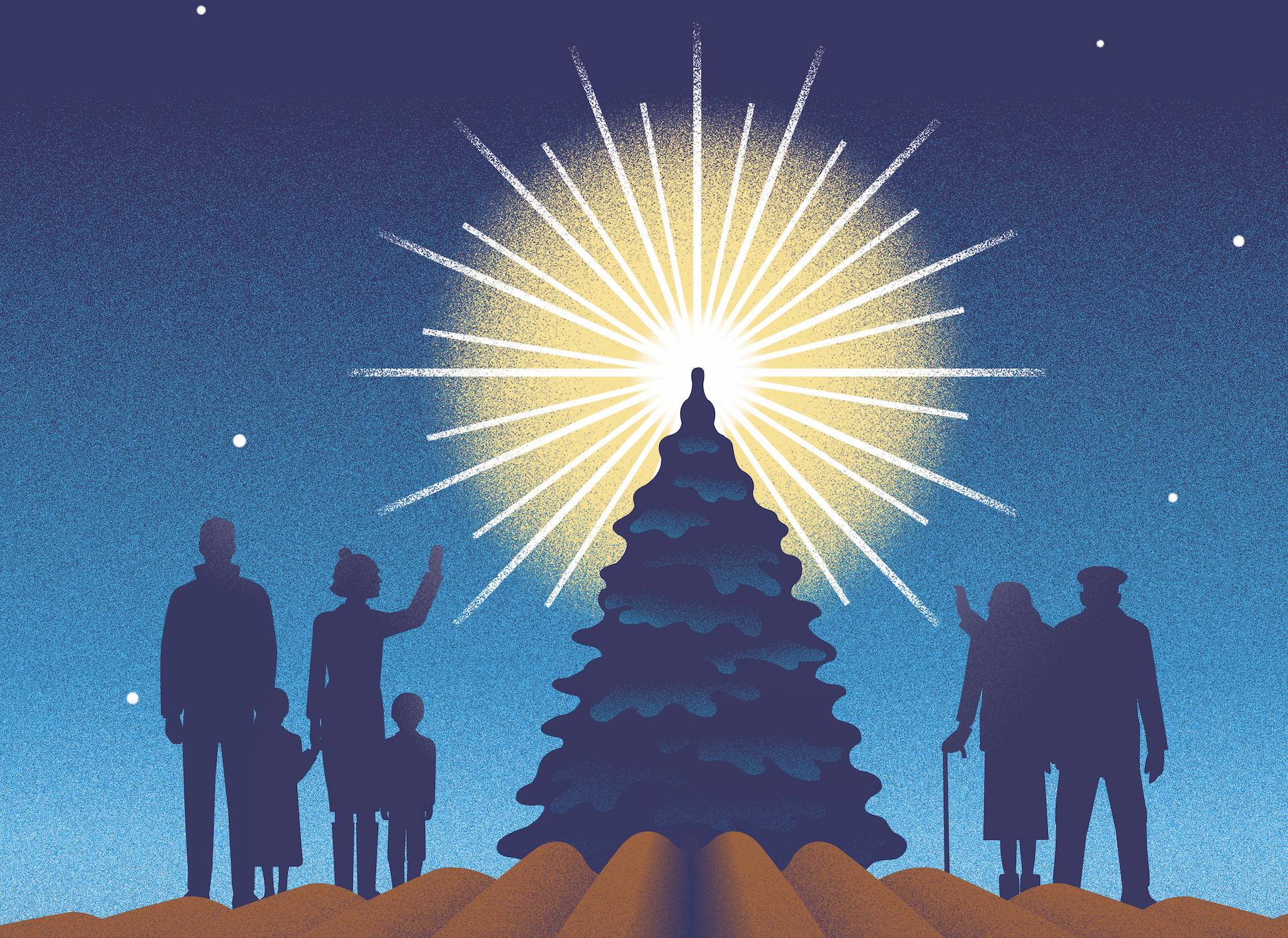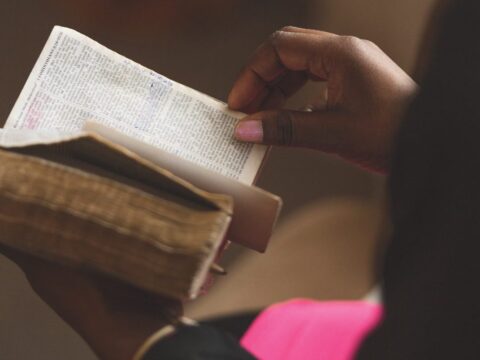I remember Advent and Christmas seasons when the church was a whirlwind of activity: pageants, potlucks, church services filled with young families, and carol singing with the choir in their best projecting voices. Amazing!
Yes, I remember Advent and Christmas in 2019. It feels a bit silly to put it that way, but it reminds me how different things are going to be this year with the changes that COVID-19 has brought to the world — physical distancing, expanding and contracting bubbles, a lack of communal singing and group meal-sharing, worshipping in much smaller groups if we’re together, or worshipping in virtual spaces. I’m grieving many of these changes. It’s been almost a year of things being “off.” I celebrate everything that communities of faith have been doing to live out their ministries in the face of things being different, but I’m sad, too.
You may unsubscribe from any of our newsletters at any time.
Grieving what was isn’t just okay; it’s important. Because while some of those things will come back, many of them won’t ever be quite the same. We’ll need to remember that each of us will have different experiences of Christmas and will be grieving slightly different things, and we’ll need to be gentle with ourselves and with each other.
More on Broadview:
- Christmas miracles begin with human moments
- Choirs are looking for new ways to sing together
- This Christmas, consider looking beyond classic children’s books
Various Hebrew scriptures describe a practice of farmers leaving a field or orchard to go fallow every seventh year of its cultivation. The land was left to rest and renew, without being worked. According to the book of Exodus, anything that grew on it in this time was for people who were in poverty, and anything left by them was for the animals. The farmers would let the land be, and the world would see what God grew on it.
I wonder if we might take this as a year to let our Advent and Christmas lie fallow. Could we find in this pandemic a time to stop and take stock of how we celebrate the birth of Jesus? A time to challenge ourselves to look at Christmas through Jesus’ lens of love? Jesus pointed out the two most important directions given to God’s people: “You shall love the Lord your God with all your heart, and with all your soul, and with all your mind,” and “You shall love your neighbour as yourself.” What would happen if this Christmas we took the time to look at our traditions and practices with that in mind?
Perhaps things wouldn’t change at all. Perhaps they’d look quite different! After all, many of our communities of faith, many of our lives and many parts of our world look quite different than they did just a year ago. Perhaps knowing that this Christmas, like our past Easter, is going to be different from other years can give us the permission to dive deeply and find out what is central to our celebrations.
There are individual practices one could look at. Why do we give gifts, and why do we give the gifts we give? Somewhere along the way, many of us have caught the consumerist messages that “bigger is better” and “more means I love you.” Why do we try to pack so much into December? What are we trying to find in our community times? What would happen if we spread those Christmas celebrations throughout the year? Asking ourselves these questions doesn’t mean we need to stop our practices. It’s simply an invitation to understand why we’re doing them.
There are some collective practices that need to be considered, too. Even communities of faith that have decided to worship in person will find that many rituals and traditions will have to be different. Unless we’ve found out something wildly new about the virus that causes COVID-19, congregations won’t be singing Christmas carols in the sanctuary this Christmas Eve. It becomes important, then, to explore what carol singing means to us. Why do we do it? How can we experience the communal joy that comes from raising our voices together if we can’t sing?
Events of this past year have also challenged us to consider our cultural practices. For people living with poverty, people living with no homes or precarious housing, and people experiencing job loss, the effects of COVID-19 meant that not only were they pushed to their individual limits, but volunteer and financial resources for many of the ministries and social services that could help weren’t available.
Christmas has long been a time when people become more charitable, but what might happen if we took this Christmas to move past charity? Could this fallow Christmas become a time of Jubilee? In the book of Exodus, this was a part of a greater cycle, a time when debt was forgiven, when people were freed from slavery, when land was returned to the people to whom it had first been given, when people had enough so they could rest safely. Jubilee for us might mean a resetting of systems of care, security and economy so that they become based on celebrating the intrinsic worth of every beloved child of God, rather than on charity.
While it has been going on for hundreds of years, the injustice and inequity of racism has been highlighted this year by the killings of Black people and of Indigenous people in the United States, in Canada, and around the world, and the protests that have taken place in response. What might Christmas — the celebration of God becoming present to the world in a new way, through the birth of a child to a Mediterranean Jewish peasant family in a land under occupation by the Roman Empire — say to Jesus’ disciples here and now about racism in all of its forms?
We could start by taking a look at the images of Christmas and noticing how many of them portray Mary, Joseph and Jesus as white, as well as the shepherds who were first to meet him. So much of the imagery in the North American church has come through the imaginations of European artists. If we picture Mary robed in blue with porcelain white skin, looking down at white infant Jesus in the manger, not only do we take away from the reality of Jesus’ story, but we begin the process of whitewashing his teachings and co-opting him into a cultural story that is the opposite of how he called his disciples to live.
Could this fallow Christmas become a time of Jubilee?
In this year, when so many of our cherished traditions will need to be set aside for the health and well-being of our families and communities, we need to remember that our hope is found in the birth of a tiny baby, who would grow up to love all of Creation into wholeness; who would challenge the powers and principalities, not just of his day but of every age, into justice and equity; who would invite the world into abundant life, and call all of his disciples to be living examples of God’s love.
And so, even without the pageants and the face-to-face gatherings, even without trees or gifts, even in a time of fallow forced on us by a pandemic, our hope is in the radical love of God, present in the Christ.
The first Christmas — from the messenger of God asking a young peasant woman if she would give birth to the One Who Saves; to the birth in a stable; to the first visitors being some of the poorest of the land; to the family seeking refuge in a foreign country to escape government-ordered killings; to Jesus coming into his ministry — is a song of hope.
This Christmas, could we let that song lead us into new ways of understanding who we are called to be?
This story first appeared in Broadview’s December 2020 issue with the title “A fallow Christmas.”
Rt. Rev. Richard Bott is the 43rd moderator of The United Church of Canada.
We hope you found this Broadview article engaging.
Our team is working hard to bring you more independent, award-winning journalism. But Broadview is a nonprofit and these are tough times for magazines. Please consider supporting our work. There are a number of ways to do so:
- Subscribe to our magazine and you’ll receive intelligent, timely stories and perspectives delivered to your home 10 times a year.
- Donate to our Friends Fund.
- Give the gift of Broadview to someone special in your life and make a difference!
Thank you for being such wonderful readers.
Jocelyn Bell
Editor/Publisher














Instead of asking “How we celebrate Christmas?”, perhaps we should be seeking “Why we celebrate Christmas?”.
A better question, “Why has God changed our way of living and fellowship, so we are unable to celebrate a “traditional” Christmas?”
I love the trappings of the holiday season, who doesn’t? Even atheists take the trappings and celebrate winter solstice.
Through the lens of love, Christ came to reveal God and to show us how to glorify Him. To show us how to share the Gospel to others. To die as the perfect sacrifice for our sins, if we accept what He did for us. And to fulfill God’s promises to Israel and for us. Remember Galatians 3:26, those who have faith in who Christ was, is a child of God. This unfortunately excludes people from being “God’s children”
Let us not forget that Israel suffered in captivity one year for each year of Jubilee they forgot. Perhaps we who are Christians have been so caught up in “things”, we forget who has blessed us and why.
In Galatians 4:4-5 the Apostle Paul writes, “When the fullness of time had come, God sent forth His Son, born of a woman, born under the the law, to redeem those who were under the law, so that we might receive adoption as sons.” (Notice the word “might”) And in Romans 5:6 the Apostle adds that “at just the right time, Christ died for the ungodly.” God took the travesties of the world in which Christ came and used it for His own Glory. We should using the current travesties of the world to show others God’s Glory.
Dear Broadview staff: Many thanks for this timely and thoughtful article on Christmas. The imagery of the Holy Family as white skinned certainly needs to change. The kindness shown to others needs to continue throughout the year.
Three-quarters through the article you decided to racialize Jesus by reminding us he is not white. As the Moderator of the denomination do you know a single UCC congregation in the 21st century who believes Jesus skin colour is white? I would like to see the statistic on this as I assume General Council can verify this since they state emphatically that we actually believe this. And because we do we are racist. Here’s a thought to chew on: If one googles the words “black nativity scenes”you will find many representations of black Jesus among Africans. Are black African Christians racist? I am looking forward to our Christmas Eve service where I get an opportunity to celebrate with anyone whom I meet the birth of the true God and true man who came among us to save all of us from our assumptions. A blessed Christmas to you.
Wow! Wouldn’t it be wonderful to follow the star and find the Babe, but also allow rest among the people. Peace among us.
But Jubilee is more than Grace for many. Jubilee forgiven debts.
Could the world actually forgive the debts of other lands and Peoples?
Could the World Bank forgive completely debts incurred, but now paid off, but have the Debt’s Interest still killing them.
I think God would be clapping for that and dancing in hearts across the globe. Now that would be a Gift to the world. Loving our Neighbours means just that!
Debts in the year of Jubilee were to be forgiven within (including “immigrants”) the nation itself, not for others.
Remember the nation “forgot” to practice this command, and it lead them to captivity.
Although some go into debt by no fault of their own, others purposely do so.
Trust me many nations who have been indebted to “first world nations” have had their debts written off.
Rev. Dr. Victor T. Mooney (a treasurer of the United Church) designed the crest and it was adopted in 1944 and is on all official documents in the United Church. Today is my blessed sister’s birthday, 5th daughter of 6 children. She was our Christmas gift, Centennial year 1967, her middle name is Christine. When she was born and my other 5 siblings the United Church crest had a lovely blue background, featured at all their Christenings. Since 2012 the crest was modified, yellow for Asians, red for indigenous, black for black people and white for the white priviledged folk. Appropriation of the Medicine Wheel by non-Indigenous people is disrespectful to Indigenous people. Our fore fathers and mothers wanted all protestant denominations to be united and uniting in a Christian Church. “Ut Omnes Unum Sint” That all may be one. I want God’s Justice in our United Church for Christmas. This year our family gift is my brother surviving a head on collison with an impaired driver in a truck on a country road last week. That all may be one with my 91 year old blessed mother divine.
Calling “white” people privileged is disrespectful as well.
Be careful what you wish for, the United Church may not want God’s justice.
In due respect, I will certainly pray for a speedy recovery for you brother, and that your mother will rest in peace in her due time.
Gary thank you for your prayer support. Atheist Greta Vosper has used the United Church as a platform for her business, books, Ted talks, business dealings with americans, marketing, products and services. She has taken God out of the equation, the Rastafarians in the church community have set up their own self styled god, so you are right Gary.